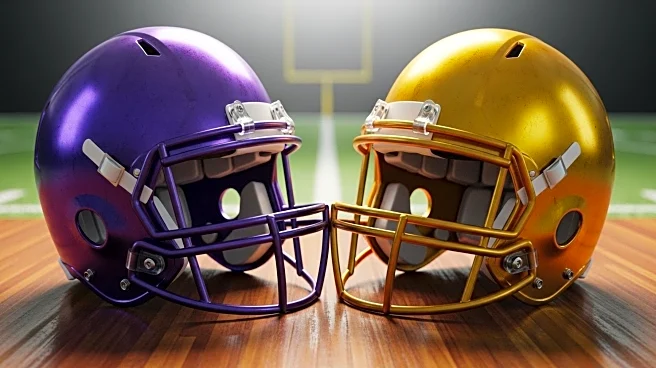What is the story about?
What's Happening?
The Minnesota Vikings are exploring options to bolster their running back position following injuries to key players, including Aaron Jones and Ty Chandler. With Jones on injured reserve due to a hamstring injury, the Vikings have already acquired Jordan Mason and elevated Zavier Scott to RB2. However, the team is seeking a dynamic playmaker who can contribute in the passing game. Alvin Kamara of the New Orleans Saints has emerged as a potential trade target. Kamara, a five-time Pro Bowler, offers dual-threat capabilities that could enhance the Vikings' offense, which is currently led by quarterbacks J.J. McCarthy and Carson Wentz.
Why It's Important?
The potential acquisition of Alvin Kamara could significantly impact the Vikings' offensive strategy, providing a versatile option in both rushing and receiving. Kamara's experience and skill set could complement the existing roster, offering a solution to the team's current challenges in the backfield. For the Saints, trading Kamara could align with their rebuilding efforts, allowing them to gain draft capital and free up cap space. This move could influence the dynamics of the NFC North, as the Vikings aim to strengthen their playoff prospects.
What's Next?
As the NFL trade deadline approaches on November 4, the Vikings may intensify their pursuit of Kamara, evaluating the potential benefits and costs of the trade. The Saints, in full rebuild mode, might consider offers that provide long-term value. If the trade materializes, Kamara could integrate into the Vikings' offensive scheme, potentially altering their play-calling and game strategy. Fans and analysts will closely monitor developments, anticipating how this move could reshape the team's performance.
Beyond the Headlines
The trade discussions around Alvin Kamara highlight broader trends in the NFL, where teams are increasingly valuing versatile players who can adapt to multiple roles. Kamara's potential move underscores the importance of strategic roster management and the impact of injuries on team dynamics. The situation also reflects the evolving nature of player contracts and trade negotiations, as teams balance immediate needs with future planning.
















